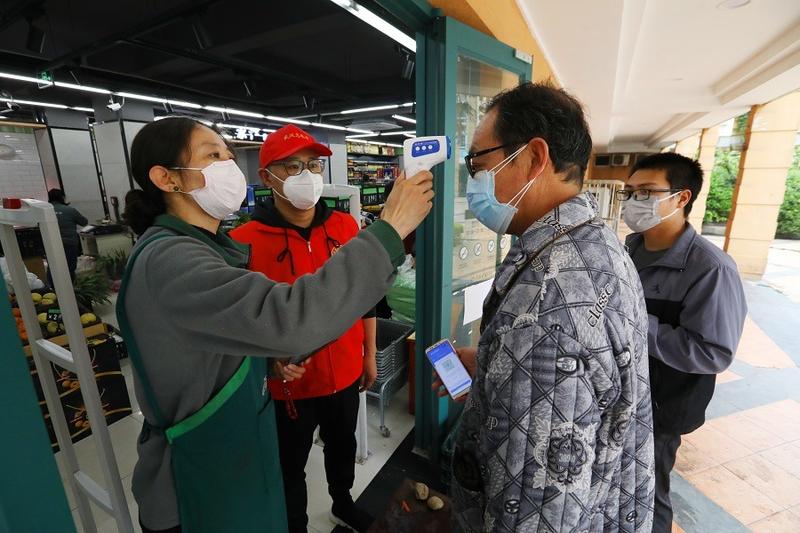 A supermarket worker checks a resident's temperature before allowing him into the store in the Jinyinhu Lianhujiayuan neighborhood in Wuhan, Central China's Hubei province, March 22, 2020. (ZHU XINGXIN / CHINADAILY.COM.CN)
A supermarket worker checks a resident's temperature before allowing him into the store in the Jinyinhu Lianhujiayuan neighborhood in Wuhan, Central China's Hubei province, March 22, 2020. (ZHU XINGXIN / CHINADAILY.COM.CN)
People in Wuhan, Hubei province, which was hit hardest by the novel coronavirus pneumonia outbreak on the Chinese mainland, have hit back at US officials for their stigmatization of the city and China, saying Washington's attempt to politicize the disease is not acceptable.
The criticisms came as some senior US officials connected the virus with Wuhan and China. They include US President Donald Trump, who described the coronavirus as the "Chinese virus", and US Secretary of State Mike Pompeo, who called the disease "Wuhan virus".
Yang Lan, a young nurse from Wuhan's Tongji Hospital, said the outbreak posed threats to all countries, and united action was needed to deal with the health crisis
ALSO READ: Stigmatization immoral, unfair, Wang Yi says
Wu Wenjie, a resident of Wuhan's Greenland Xisilai Mansion Community, said she was indignant about the US officials' irresponsible remarks.
Labeling the virus with Wuhan and China insulted Wuhan residents and the Chinese people, Wu said, adding that stigmatizing a country would not help to contain the pandemic globally.
Yang Lan, a young nurse from Wuhan's Tongji Hospital, said the outbreak posed threats to all countries, and united action was needed to deal with the health crisis.
As the virus spreads quickly in the United States, US officials are trying to divert public attention from their own lackluster response to the outbreak by blaming China, Yang said, adding their remarks were politically motivated.
The World Health Organization named the pneumonia caused by the novel coronavirus COVID-19 on Feb 11 to avoid stigmatizing a country or particular group.
WHO officials have warned against calling it the "Chinese virus", saying that could lead to racial profiling.
READ MORE: WHO warns against mislabeling coronavirus
Xu Meng, a businesswoman who sells Chinese tea in Wuhan, said the virus knows no borders or races, and countries should work together to fight against the common enemy instead of pointing fingers at others.
Those using the virus as a political weapon to attack others obviously lacked the mercy that humans naturally had, and their actions were disgusting, Xu said.
Liu Wenwen, who manages business affairs for ride-hailing giant Didi Chunxing in Wuhan, said that as a Wuhan resident, she refused to accept the stigma.
Linking the virus to Wuhan or China was not science-based, Liu said, urging US officials to give more attention to the fight against the virus instead of stigmatizing China.
Zhong Nanshan, a prominent Chinese respiratory disease expert, said at a news conference on Wednesday that although Wuhan first reported the outbreak, there was no evidence the city was the source of the virus.
READ MORE: US' virus stigmatization against China is xenophobic, unhelpful
A lot more needed to be understood about the novel coronavirus, and international cooperation was important in fields such as drug development, he said.
Cyril Makembe, a student from Tanzania studying at China University of Geosciences in Wuhan, said it's not good to label the coronavirus as "Wuhan virus" or "Chinese virus".
The coronavirus had spread all over the world, and China's efforts to curb the contagion and to help other countries were impressive and should be respected, Makembe said.
Contact the writers at caodesheng@chinadaily.com.cn


